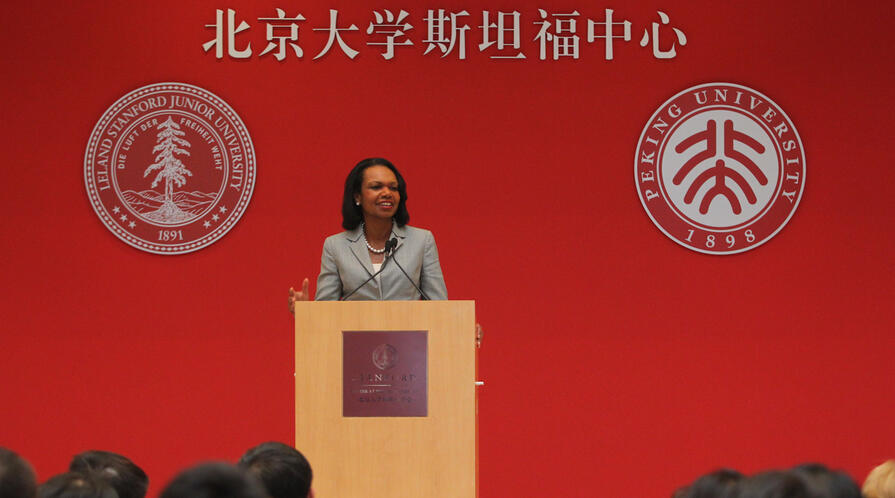Condoleezza Rice spotlights role of technology in addressing global urban development and governance challenges
Condoleezza Rice spotlights role of technology in addressing global urban development and governance challenges

Speaking at the Stanford Center at Peking University (SCPKU) on September 22, Condoleezza Rice, the Denning Professor in Global Business and the Economy at the Stanford Graduate School of Business; the Thomas and Barbara Stephenson Senior Fellow on Public Policy at the Hoover Institution; and a professor of Political Science at Stanford University, said that technology and education are key drivers in achieving sustainable urban development and cited opportunities for China and other developing countries to harness this innovation and mobilize human potential.
Rice’s remarks were part of her keynote address during SCPKU’s inaugural Lee Shau Kee World Leaders Forum. Welcome remarks were given by Jean C. Oi, the Lee Shau Kee Director of SCPKU and Senior Fellow at Stanford University’s Freeman Spogli Institute for International Studies (FSI), and Peking University (PKU) Prof. Min Weifang and former PKU Chairman. Michael McFaul, Director and FSI Senior Fellow and former U.S. Ambassador to Russia, introduced Rice who highlighted the opportunities of technology and innovation as well as the governance challenges they can bring.
“If we remember technology is the application of knowledge to a problem, we can begin to address some of the problems of governing with the application of technology.” Rice said. “It is really a question of whether we can marry human potential and technological possibilities to solve our problems. Human potential is key to innovation, and in that regard, the most urgent tasks are around education.”
Rice spoke before an audience of 150 government and academic leaders, scholars, and students at SCPKU. Following her keynote address, she participated in a roundtable discussion with policy and thought leaders. The discussion was chaired by Karl Eikenberry, Director of the U.S.-Asia Security Initiative at Stanford’s Asia-Pacific Research Center and former U.S. Ambassador to Afghanistan. Panelists also included Dr. Wang Yiming, Deputy Director General and Senior Research Fellow at China’s State Council Development and Research Center, and Prof. Tong Zhu, Dean of the College of Environmental Science and Engineering at PKU.
“This was a unique opportunity to convene thought leaders on a topic of significant importance to China and the world,” said Prof. Oi. “China’s urbanization has been one of the most rapid in history. Technology innovation can help address the challenges of urban governance where people’s lives have changed in one generation.”
